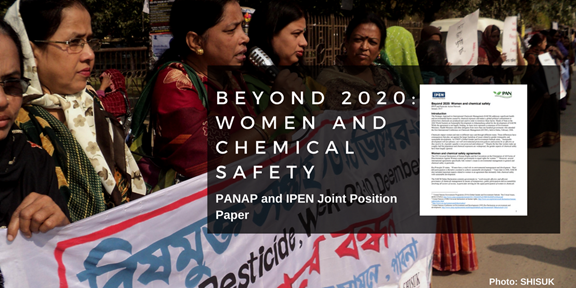When nearly 400 delegates met in Brasilia recently to discuss how to manage chemicals beyond 2020, there was a surprising degree of accord that the current multi-stakeholder approach should be preserved in whatever arrangement is arrived at. That means NGOs like PAN would continue to participate in the process as equal partners.

Why Beyond 2020? Because the current UN Environment-based Strategic Approach to International Chemicals Management (SAICM) expires in 2020. It was supposed to have met its target of sound chemicals management by 2020. Obviously it has not, or pesticide poisoning would not still be occurring.
Despite the accord on the multi-stakeholder approach, there was not a similar accord on whether or not the new approach should be voluntary or legally binding. Considerable interest was shown in a paper recently released by the Nordic Council of Ministers, which discussed amongst other things the idea of an overarching global convention on chemicals management that would scoop together all the existing conventions under one convention. One of its author’s, Sabaa Khan, was at the meeting and such was the interest in the proposal the African Region asked for a special session with her and emerged from it supporting a legally binding convention. NGOs, Africa and others asked the secretariat to prepare a paper on governance options for the next meeting in the series that lead up to the decision in 2020 on what to do next.
Although individual chemical issues where not on the agenda, PAN Asia Pacific did succeed in raising the failure of SAICM to deal with the problem of Highly Hazardous Pesticide (HHPs), especially their impact on children and human rights.
A number of countries echoed our concern, referring to problems they were having with pesticides – no doubt this support was in part because, unusually, officials from health ministries where present to compliment the usual environment ministries – thanks to the World Health Organisation (WHO). CropLife’s comment that there was no need for any extra tools to manage HHPs (although they “didn’t deny the issue is serious”) so incensed the delegate from South Africa that she quotably stated: “HHPs should not even be in the bucket in the first place”. We agree!

PAN and IPEN also drew attention to need to address the special vulnerability of women to chemicals and succeeded, with the support of other delegates, in getting the secretariat to provide a discussion paper on this for the next meeting, in March 2018.

The whole context for chemicals management beyond 2020 will be embedded in the AGENDA 2030 Sustainable Development Goals, adopted by the UN General Assembly in 2015, many of which strongly reflect the need for work on HHPs and their replacement with agroecology. Sustainable development cannot succeed whilst the current model of chemical intensive farming continues to dominate.








Discussion about this post